Madder Than Expected
– how climate scientists and the IPCC still won’t tell the truth about accelerating climate change.
Three years ago, I highlighted the undeniable fact climate scientists were misrepresenting how serious climate change already was, with dire consequences for meaningful responses from the rest of humanity. Everything was happening way faster than they predicted, simply because the slow-paced academic methods they exclusively relied on could not keep up with the pace of change.
Three years later, nothing has changed. Every new, alarming, climate-change event either hits or significantly exceeds the worst-case scenarios of scientists’ models. Surveys do say, ‘awareness’ of the problem has increased and more ‘support action’, while governments and corporations have made advances at ‘policy level’ prompted by the Intergovernmental Panel on Climate Change (IPCC) – the UN body responsible for telling us what is going on. The problem remains, however, as climate scientists know very well, that by April 2025 in the real world – far, far away from falsely-reassuring, IPCC under-estimates – global average temperatures have exceeded the ‘safe-limit’ of 1.5°C above pre-industrial levels, for 22 of the previous 23 months.
In the first 4 months of 2025 these averaged above +1.6°C – a period which climate scientists, unanimously-wrongly, predicted would see a significant drop due to the impact of a La Niña, a powerful, naturally-occurring climate event in the Tropical Pacific Ocean that should have had a cooling impact but was counteracted by the man-made causes of immense heating elsewhere.
These temperatures are wildly ahead of predictions; as recently as 2015, the Paris Climate Agreement, relying on the IPCC’s summary of the science, claimed we could stay under +1.5°C by 2100 - if we hit ‘net-zero carbon emissions’ by 2050 (a strategy still endorsed by the IPCC).
You might want to read those numbers again. What they tell us is, in 2025 we’ve blasted past a dangerous temperature limit, set for the end of the century only 9 years ago. They also reveal we are still relying on obviously-redundant solutions like ‘the transition to renewables’, ‘carbon capture/removal’ and ‘EVs’, to prevent us getting to a dangerous point we’ve already passed.
Many scientists admit to being frightened. They understand that, regardless of a tsunami of greenwash from the ‘green industry’, we are on an accelerating trajectory towards temperatures well in excess of +2.0°C and the breakdown of global society these will bring. One of the few scientists willing to make ‘live’ projections in public, the marine biologist and IPCC contributor Greta Pecl, gives us less than five years before loss of agricultural yields and extreme events become unmanageable. She may be pessimistic (or not - maybe it's ten years and maybe it’s three), but Pecl cannot be dismissed as radical; the basic science and simple, observational data is so clear, emotion-free analysts at J.P. Morgan, the world’s biggest bank, anticipate at least a +3.0°C hotter near-future (albeit while failing to understand there won’t be much left to invest in by then).
In spite of their well-informed fears, the vast majority of scientists continue to research fragments of the problem before writing up their findings in papers they know will be out-of-date by publication, while the IPCC’s response is simply to bury their heads still deeper in the sand. Current president Jim Skea insisted, in an interview with AFP in March 2025, that not only will they continue to rely only on these studies to inform their advice, they won’t change their 7-year reporting cycle either (next report due 2028), on the grounds this ‘very elaborate process of review’ as he calls it, gives them ‘the stamp of authority’.
This makes little sense; the authority of an advisory body is worth nothing if its ‘elaborate’ methods inevitablylead to significant understatement of risks. This has long been so obvious, even the deputy chair of the IPCC itself from 2015-2023, Thelma Krug, publicly conceded in February 2024 their reports are ‘years out-of-date by the time of publication’ and do not provide ‘the correct signal to the world’ hence the urgent need, ‘to create shorter, targeted reports’.
In this absence of clear scientific messaging, most non-scientists from governments to the general public have no idea that, brutal and heart-rending as so many of the world’s many crises are, the consequences of climate change increasingly threaten to overwhelm them all. If anything, understanding is going backwards. Governments and corporations are abandoning or diluting even existing, ineffective plans. The global media appears similarly oblivious as witnessed by the UK Guardian, a climate coverage leader, in April 2025 publishing the untrue claim that scientists supported the idea, we have the ‘tools’ to limit warming to below +1.5°C. This contradicted the Guardian’s own May 2024 survey which reported that 400 IPCC contributing authors believed this limit would unavoidably be breached by 2030, if not sooner, as has now happened.
Misunderstanding is so widespread climate denialism is mainstream again, led by the spectacularly ignorant example of the USA, whose journalists studiously avoid mentioning climate change while related, extreme events like unprecedented numbers of tornadoes in April/May 2025, many bigger than seen before in places and at times they shouldn’t happen, batter their hapless citizens. Along with denialism - to square the circle of an undeniable increase in catastrophes - has come a resurgence of fantastical conspiracy theories, including the use of ‘weather weapons’ as endorsed by US Congresswoman, Marjorie Taylor Green.
So – WHY ON EARTH won’t climate scientists and the IPCC provide the expert ‘live’ climate-change assessments humanity so desperately needs?
The truth is the basics of climate science are not complicated and have been settled for decades; it’s only the rapidly-changing details that scientists can neither keep up with nor accurately predict. Humanity does not need any more out-dated, jargon-packed ‘research’ into this or that jet stream variation or methane-emission source or melting glacier or hurricane or whatever. Humanity does need expert advice on what’s most-probably happening RIGHT NOW together with best-estimates of what’s most likely to happen next. The reasons our scientific community still refuses to provide vital expert information ‘live’ can be summarised as follows, (the psychological components explain the most irrational elements):
1. Scientific ‘caution’. All academic scientists don’t allow each other to publish or comment formally on anything that does not comply with the strict rules of the scientific method. Adherence to these, learnt as gospel in their first undergraduate terms, is a condition of belonging to their elite group. They ego-identify with this special status, it’s vital to them, something they can’t ‘kill’, even when they know such inflexibility will cause unprecedented harms including to themselves.
A few groups of senior scientists led by the likes of James Hansen and William Ripple do put out occasional ‘macro-reports’, highlighting wider, ‘faster-than-expected’ climate-change concerns. Hansen et al. in November 2023 drew attention to the disastrous probability scientists had under-estimated the climate’s ‘sensitivity’ to greenhouse gas increases, while Ripple et al. in October 2024 issued an ‘urgent warning’ that new observations showed accelerating warming threatened to trigger multiple, catastrophic ‘tipping points’.
These group efforts and individual studies always conclude with standardised demands for ‘reductions in emissions’ or ‘urgent action’, but scientists know these will be ignored, not least because they are not connected to an overall narrative; that’s the job of the IPCC. The only purpose these warnings serve is to soothe the vertiginous-unease of scientists’ cognitive-dissonance, provoked by the chasm between the terrifying truths they know and their public understatements.
2. The IPCC – it’s worth repeating given how mad it really is, refuses to depart from an absurdly-narrow interpretation of their advisory remit that insists they only reference data published in scientific papers that take years to produce, which they then take further years to review; making this information, and the advice they base on it, inevitably out-of-date in an accelerating context. This insanity – where insanity is clinically defined as not being in touch with observable reality - extends to not updating their advice when new, valid, observational data from reputable institutes corrects the conclusions of these source studies. This is a kind of organisational psychosis, colluded with by a lack of meaningful challenge from the wider scientific community.
In his April 2025 interview Jim Skea also claimed, there’s ‘a lot of intense scientific study going on to try and understand, precisely, what’s happened over the past 2-3 years’. Skea is blatantly obfuscatinghere, a classic psychological defence; he knows there is no way scientists can deliver studies capable of understanding anything ‘precisely’ in this time of bewilderingly-fast change.
Just one, of countless, examples is the massive melting of ice across the Arctic Circle and Antarctica, far faster than predicted. Climate scientists know, without a shadow of a doubt, this is caused by warmer ocean currents and/or reduced albedo and/or shifts in the jet streams and/or a reduction in global ‘dimming’ - and their interaction - all provoked by man-made global warming. They also know they will never be able to ‘explain precisely’ which of these factors is most responsible. The practical challenges of operating in these vast wildernesses plus how fast the situation is changing make obtaining reliable observations, on which ‘precise’ academic methods rely, impossible. Even the conclusions of studies where better observational data is available, aimed at the causes of say, extreme events impacting the USA, will inevitably be limited and overtaken by still worse impacts.
Jim Skea’s insistence on waiting for scientists to apply what Harvard scientific historian Naomi Oreskes calls ‘the unnecessarily-high bar’ of scientific proof, knowingly invalidates the IPCC’s subsequent advice, leading to further delay of meaningful responses. Exactly the same happened with the IPCC’s most recent report (AR6) issued in December 2023 - and still headlining their website – which references, with a very few exceptions, only data from scientific papers published before 2021, the year they last finished ‘synthesising’ available science. As such, the ever-accelerating speed of change has rendered obsolete virtually all the advice in this 2023 report and means their next ‘synthesis of the science’ update, due in 2028 in advance of their next full report (AR7) in 2030, will be even lessreliable.
3. False Hope. If all this wasn’t bad enough, the IPCC and those few senior scientists who engage with the media, deliberately playdown risks in their public messaging. Hence the widespread insistence we’re not really past 1.5°C yet, because only a spurious calculation combining the average of the last ten years with dubious predictions for the next ten can confirm this. Given the temperatures of the last two years and a clearly-accelerating context this argument is mathematically-stupid - but is still parroted by a media eager to convey the implied message of ‘no need for radical action yet’. Also effective in minimising alarm and legitimising business-as-usual is the delusional but widely-endorsed concept of ‘overshoot’; this suggests humanity can, ‘dial temperatures back down’ via the deployment of massively high-risk and still-experimental geo-engineering interventions.
Under this false-hope banner, the IPCC notably adopts the opposite of the rigid standards it applies to scientific evidence, when considering the impact of climate ‘solutions’, not least the possible removal of carbon from the atmosphere (CDR). The IPCC AR6 Working Group (WG3) tasked with modelling future levels of greenhouse gases endorsed wildly-unrealistic claims for the deployment of CDR, which in 2025 still shows no sign of being developed to anything approaching a meaningful scale. This WG3 was chaired, before his promotion to overall IPCC chair, by Jim Skea.
This psychologically-flawed idea that scientists should maintain ‘hope’, to the extent of understating existential risks and exaggerating humanity’s ability to implement ‘solutions’, was first championed by the UN and is intended to spur action – unsurprisingly, it has the opposite effect.
More primitive defences…
‘Primitive’ as in related to early-development, includes narcissism, a strong flavour of which appears among ‘celebrity’ climate scientists caught out by accelerating events they failed to predict. Seemingly unable to tolerate admitting their mistakes (or use these as an effective method of communicating the seriousness of our situation), they divert attention via such techniques as:
- Simple lying. Includes those like Richard Betts, IPCC AR6, AR5 and AR4 lead author, shamelessly pretending accelerating temperatures are consistent with their predictions – they are not. To (misleadingly) get around this, several like Zeke Hausfather have taken to inserting the latest data into the massively-flawed models they recently endorsed with conviction, then running these retrospectively before, hey presto, releasing new versions that make it look like they were right all along.
- Projection. Aka blaming someone else. Michael E. Mann, the pre-eminent, multi-award winning (full list available on his website), climate-science commentator, suggested in October 2024 another Trump administration would cause 1.5°C to be exceeded - as if the inadequate policies of the Biden/Harris regime (as endorsed by Mann) hadn’t got us there already.
- Negotiation. A relative of denial – those scientists endorsing clearly-inadequate responses belong here including the World Meteorological Organisation’s ‘Director of Climate Services’ Christ Hewitt, who announced in May 2025 that, ‘1.5°C is not inevitable’ - while simultaneously acknowledging breaching 2.0°C before 2030 was highly likely.
Jim Skea, meanwhile, in advance of the inevitable, ‘why didn’t you tell us?’ questions coming his way when horrific unmanageable impacts hit even wealthy nations, has been careful to publicise his actual defence. When stating the IPCC could not advise ‘live’ - i.e. accurately - because they had to wait for climate scientists, Skea made sure to add, ‘…and just to say, I am not a physical climate scientist myself.’ So, climate scientists should note, the man leading the UN authority actively misrepresenting what they know, is pointing the finger of blame directly at them.
It is psychologically possible that Skea’s ego has become caught up in the status of his role to the extent he prioritises telling the powerful what they want to hear. Less likely, he’s been sucked into the vortex of those actively willing the end of humanity - a bizarre reality among some US politicians believing in, ‘The Rapture’. Most probable, however, is Skea has a quasi-religious belief in science itself, hence the refusal to reference anything not formally ordained as ‘good science’ is sacrosanct, however inaccurate this may lead his organisation’s advice to be - but it's also okay to believe omnipotent scientists will invent technologies to save us. Skea may be suffering a kind of widely-held, ‘science-delusion’; the grandiose belief human science can understand and master all of Nature.
Meanwhile, on the Death Star…
In marked contrast to the catastrophically-ineffective communications of scientists, the fossil fuel/corporate sector has targeted significant, professional resources at reducing understanding. They skilfully disseminate greenwash propaganda and/or denialism, leading to the surreal spectacle of the public still being exhorted to consume/destroy ever more resources in the interests of ‘economic growth’ aka the very behaviour we must radically curtail to have any hope of mitigating the desperate harms heading our way.
Even those appropriately-terrified by a destabilising climate have been duped into believing fantasies like a ‘transition to renewables’ will save us, when these were never alternative only additional sources of emissions. Only radical reductions in resource-destruction (aka slashing economic activity) could make any difference now, as this graph shows and scientists know but refuse to spell out;
The corporate ‘successes’ don’t stop there. The COPs (Conferences of Parties), the annual global climate summits, which as Jim Skea proudly states ‘refer back to IPCC reports’, have been overwhelmed by the private sector who contributed more than half the delegates at COP29 in 2024. For good measure, the 2023 and 2024 COPs featured as presidents, respectively, a former director at SOCAR, Azerbaijan’s state-owned petroleum company, and the CEO of the Dubai National Oil Company. The IPCC and the green ‘industry’ bandwagon will attend again in Brazil in 2025 but it’s unlikely so many corporate delegates will bother; the COPs have been neutralised, no one will pay serious attention to COP30’s impotent conclusions.
It's easy to be distracted by the world-leading narcissism of the USA’s naked emperor and his dangerous court - and a widespread political lurch to the far-right is terrifying – but in reality, Trump’s arrival had no significant impact on private, corporate or public sector climate-related behaviours, because no-one was making any meaningful attempts to reduce temperatures or emissions anyway. The only difference is many have stopped pretending – hence oil-giant BP advertising in March 2025, their ‘re-set’ of priorities to include a primary focus on ‘Growing upstream: increasing oil & gas investment to $10bn approx. p.a.’
The Trump administration has, however, fired 1500 climate scientists from the US National Oceanic and Atmospheric Administration (NOAA), with 4000 more climate-related roles due to be axed both there and at NASA. The Democrats would not have done this and it is astonishing such ferocious censorship of major climate-change information sources has provoked no response from the IPCC.
Leave the poor scientists alone.
None of the feedback from my writing, including from scientists themselves, factually debates the limitations of individual studies nor the hopelessly-inadequate systems of the IPCC. But there is one consistent complaint - that it’s somehow wrong to criticise climate scientists, because they’re ‘the good guys.’ The problem with this is the ‘bad guys’ in the corporations and governments, even those few who understand the risks, have little choice; either they collude or they are out. All climate scientists, on the other hand, with their profoundunderstanding of the incredible threats, could find ways to communicate more effectively. Scientists are the only expert group capable of provoking the drastic changes required to avoid total chaos and their ethical duty to do so is unprecedented.
Michael E. Mann was the loudest advocate in 2023-2024 of the utterly-wrong theory that increasing temperatures were ‘just an El Niño’ - and chose then to attack as ‘doomers’ those accurately pointing out these temperatures and every climate signal, were way more alarming than the IPCC/Mann etc were allowing. Mann’s allegation that such doomers were ‘as dangerous as the fossil fuel industry’, was so enthusiastically picked up by the global media, even the UK’s Prince William warned against the alleged threat they posed. Less hilariously, Jim Skea also joined these attacks but the truth is, as current temperatures and their consequences evidence, the doomers were right; it was the minimising of the IPCC and the likes of Mann that had the same disastrous consequences for meaningful action as any denialist corporation.
Even Jim Skea admits now, ‘We are at the boundary of exceptional circumstances for the global indicators but for particular regions and for example, for ecosystems, we are also well beyond the boundaries of the expected range’. He chose not to add that current IPCC reports failed to predict this desperate situation nor would their advice reference these ‘exceptional circumstances’ - aka what’s actually happening - until 2028, but his comments were consistent with leading scientists in April 2025 being reported as ‘terrified’ (The Independent), ‘startled’ (Earth.org), and ‘mystified’ (The Guardian).
This claim to be mystified is disingenuous. There is no mystery because scientists know they have longbeen caught out by the speed of events simply because their methods cannot keep track of or predict the many, catastrophic, inter-connected, accelerating impacts and feedback loops in progress. These evidence a difficult truth that scientists have yet to acknowledge; it’s simply impossible to accurately model the complex, dynamic Earth System and it’s a delusional conceit to pretend otherwise.
Given their expert understanding there is no reason to doubt, however, scientists do feel ‘terrified’ in the comfort of their offices (if they’ve still got one in the USA) - but there are increasing millions of others with more urgent reasons to feel terror. Western media shamelessly limits serious reporting of climate-related catastrophes to those impacting relatively-affluent areas, like the 2024 Los Angeles wildfires and Valencia floods, but every continent, country and sea on the planet is being significantly affected to an unprecedented and desperate extent. Thus, almost completely ignored, the UN announcement of the number of people misplaced due to climate-related disasters rising to 45.8 million in 2024, nearly double the yearly average.
The answer – fear is the key.
All climate scientists and the IPCC need to abandon their self-imposed limitations on what they can say. The most senior, there are only a few hundred of them, plus Jim Skea, need to act collectively to enforce a radical shift in professional emphasis towards communicating what they know, away from only what their inadequate, academic efforts can technically ‘prove’. It’s ethically-unacceptable for them to restrict themselves to bleating demands for ‘emissions reductions’ at the end of complicated studies no-one reads; they must find ways to convey unanimous, unambiguous, ‘live’, accessible messaging explaining the incredible risks and what radical change needs to look like.
It is past time for scientists to admit there is only one running model worth observing - and that’s the planet itself. They must concede the obvious; in this accelerating situation the only way scientists can usefully communicate what’s happening is to analyse, summarise and advise in real time.
And that advice needs to pull no punches – realistic fear is psychologically-essential to provoking urgent, meaningful action.
Jim Skea says the IPCC is ‘not a 24/7 news organisation’ but they need to be – or at least very close. Humanity needs real-time, expert information prepared by the best-qualified scientists, commenting on what’s happening across the planet – not 7-yearly!!! - with longer-term work backing this up. I wrote something similar 3 years ago but this could not be more urgent now. To give humanity the advice we desperately need, the IPCC, Mann, Hansen, Ripple, Skea et al. collectively need to:
· Abandon the false-hope playbook – provoke the stimulus of rational fear.
· Declare 1.5°C has gone and 2.0°C-plus is inevitable - make the powerful admission traditional academic methods cannot keep up.
· Achieve clarity – create a unanimous, collective narrative conveying, ‘IT’S ALL CLIMATE CHANGE NOW’. Abandon specious ‘attribution studies’, be clear the ONLY unknowns are how fast and extreme consequences will be.
· Be honest about ‘solutions’ – inadequate responses are not better-than-nothing – current ‘net-zero’ etc plans enable catastrophe/block meaningful action.
· Target the influential - media, marketing, political, corporate etc leaders. Meet them, persuade them, frighten them - make them understand their lives are at risk too.
· Target other scientists - explain the desperate risks, startle them into co-operation with the task of effectively communicating what the science shows.
· Change IPCC methods - if the IPCC refuses to represent what scientists know, denounce them on ethical grounds, withdraw support, with maximum media involvement.
· Lead by example - radically change their own behaviours – teach only climate change ‘live’ – make communication of risks the ethical priority for all climate scientists.
· Develop effective public communications - with professional help, provide accessible, expert content across all social media channels explaining likely connections between extreme events ‘live’ and the changing climate. Improve explanations – not only, ineffective ‘average temperatures.’
· Counter aggressively any doubt, denialism and conspiracies on all platforms.
Conclusion
My next piece will outline in more detail why the fantastical claims led by the UN for the maintenance of business-as-usual, only powered by alternative energy and using ‘renewables’, are so catastrophically meaningless. Without an understanding of how serious our situation already is, however, there is no hope for a shift towards the radical/sane actions needed to avoid a chaotic breakdown of global society. No-one understands this better than climate scientists and no-one except them has the authority to convey these truths. The IPCC’s insistence on relying only on ‘the science’ to inform their vital advice to humanity – when their self-imposed limitations on what qualifies as ‘the science’ undeniably result in them lagging years behind – is a clear and unethical abuse of their authority.
In the real world, our essential habitat and thus our capacity to survive at all, is increasingly threatened while our governments only get madder, as the fate of US climate scientists demonstrates. The climate science community is running out of time to do something about it.
-------
PS Support I made this free because I only post once a month or so. If you are able to help me focus more time on these by supporting my work then please click here - thank you.

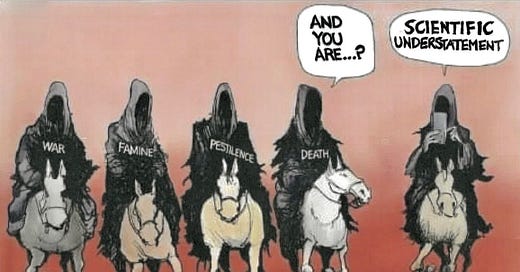



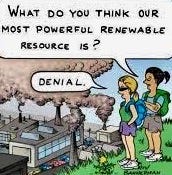
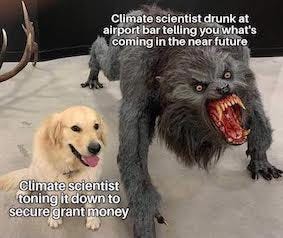
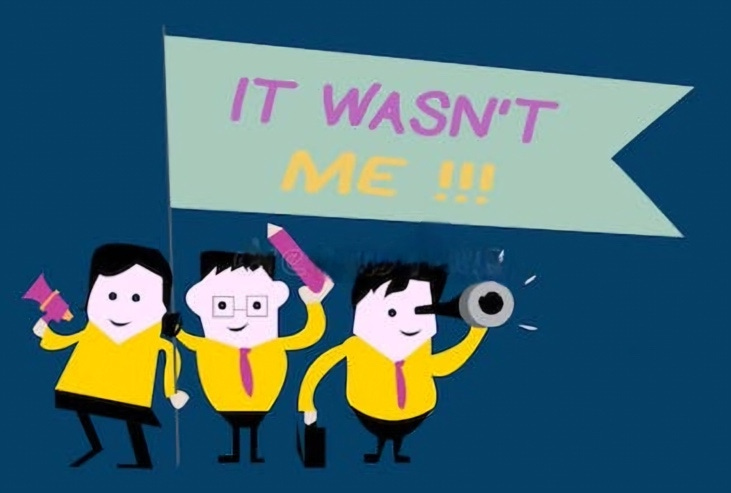
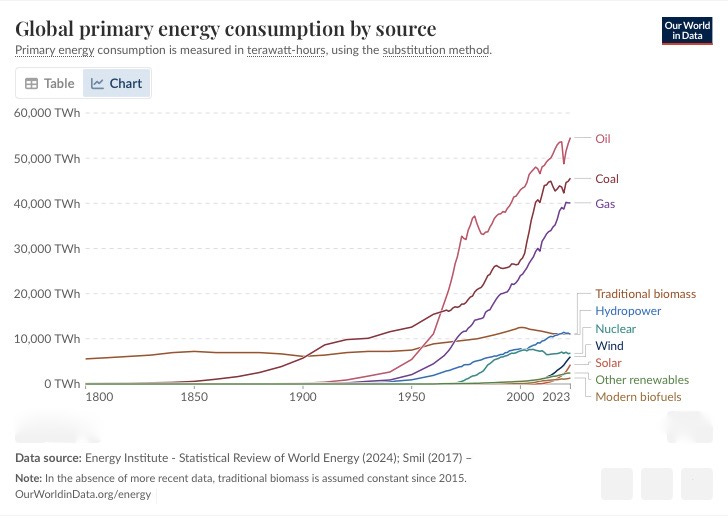
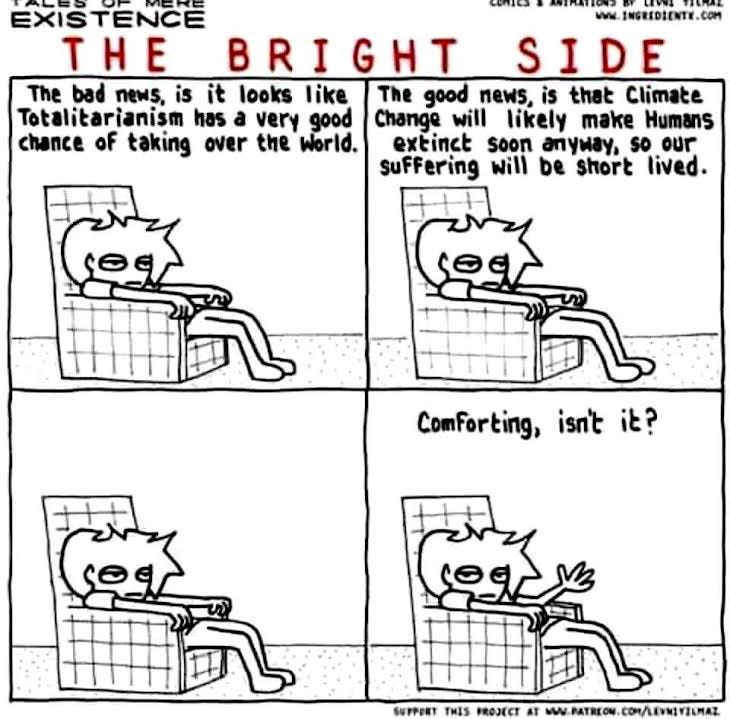
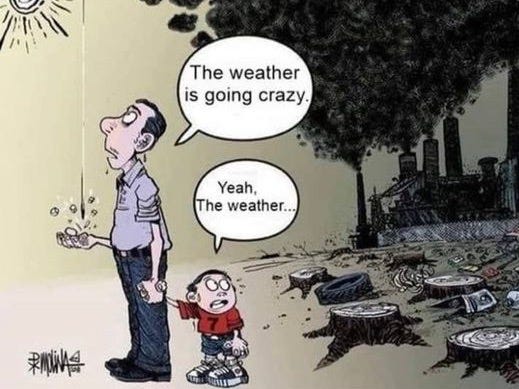

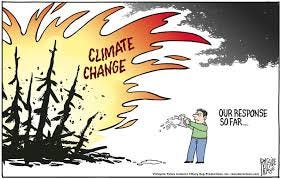
I do not agree. I've been following climate science closely since 1988 and earth science in general since forever. Take 1988, Jim Hansen gave what I consider the first serious, No doubt, warning to US senate and it's televised around the world. Since then there have been literally thousands of ever more dire warning from climate scientists and similar ever more dire warnings from wildlife and conservation biologists, warning of Overshoot and potential doom from environmental collapse unless humans change their behaviour and what did we do when the first serious climate warning were given in 1988? Globalization WooHOO!! We ushered in history's greatest economic BOOM/shopping spree with globe spanning jet setting vacations, SUV's and McMansion (bigger&bigger ever year) with a bang. There is no lack of information. If you need huge teams of scientists to repeatedly hit you in the head with information hammers everyday, you and your offspring are already done and you have no one to blame. They know.
Almost all the scientists know. The general population knows and even the deniers know. Deep down past all the bullshit and denial and reticence and career ladder climbing and job protection and status preservation they all know. Everybody knows. Same as addicts know, but wave it away, deny and lie, but they still know. Nature is rife with deception, but the humans excel at self deception. This is because the best liars are the ones that first lie and con themselves.
If free will exists then they all deserve what is coming. Alternatively, the humans are no different than all other creatures, in that they are following their biological programming -which they are not the authors of- and it's all a big fucking tragedy.
When discussing the IPCC, it's imperative to understand that it is a corporate construct or as my friend and former colleague Professor Guy McPherson frames it" The designed to fail IPCC."
Additionally dive into my blog post titled:" Scientific Mal-Practice from the Mann Himself", calling out Mann and his bare faced lies.
https://kevinhester.live/2018/08/08/scientific-mal-practice-from-the-mann-himself/comment-page-1/
https://kevinhester.live/2021/09/06/its-time-to-acknowledge-the-spectacular-success-of-the-ipcc/